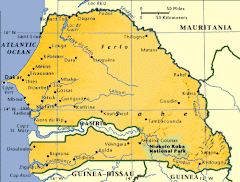
The chief of Godj (Well Rope) has recently given us permission to story in his village. A couple of weeks ago I went riding on my motorcycle out towards the area we have been asked to target. My objectives were to get used to riding in the sand again and to see who I would meet and what the Lord might do. I was looking for one village in particular (called Lanta) where I had already met one man, but that was only one village. Besides, they have yet to connect me with the village chief there.
I suited up in my riding clothes (due largely to the fact that I didn’t know where I was going and I had no idea what I might meet up with) complete with riding boots, etc. I found Lanta and stopped to ask if my acquaintance was there or the village chief, but neither were there that day. Then I kept riding and rode through a couple of villages before stopping at a meeting place just off the main road (wide sand track for horse carts and missionaries on motorcycles). There were a lot of men there so I stopped and talked. We all shared the same last name (N’diaye). As I chatted with them they all invited me to lunch. I would finish in one place when someone else would call and invite me to lunch. (I only ate once…)
I stuck with the guy that first invited me to lunch and met his family. He ended up giving me like 8 kilos of peanuts. I described the house to them all and one day last week one of them showed up at my house to greet me. I told him further what I wanted to do and told him that I would go there on Tuesday to talk to the village chief.
I showed up and met with the village chief and we talked about what I want to do. I told him that what I want to do has two sides. One side is to see how we can seek to help them in their physical life. But that side is not enough. I told him that even if I was able to put billions in helping the village, unless God blessed the village, it wouldn’t help. That is the other side of what I want to do there and it’s so much more important. That is to seek to help them know God deeply. I told him I would do this by teaching the first books of God (Old and New testaments). He was agreeable! So, the Lord willing, we will start there when they are completely finished with the harvest.
Pray that God gives us wisdom about how we can proceed with the physical help and how we should do this in a way that would be harmonious with the Gospel and what we desire to do in that vein. Pray, too, that God would open the door to Lanta and other villages. Thanks!


